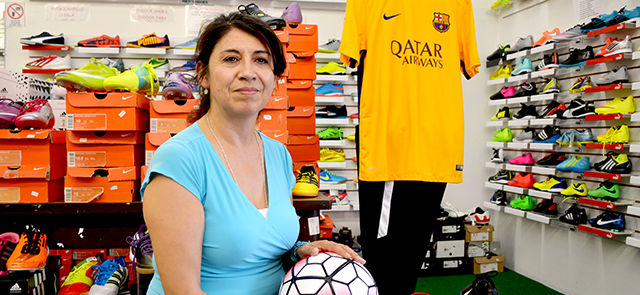 Stitching jerseys and jackets in a basement seven days a week is no task for the weary. When you know that is the only way to get a business off the ground, you make it happen.
Stitching jerseys and jackets in a basement seven days a week is no task for the weary. When you know that is the only way to get a business off the ground, you make it happen.
Such is the story of Astrid Acero López, who emigrated from Colombia in November 1988. She and her husband, Jorge, had two toddlers in tow … and the dream of starting a business in the U.S.
The idea was to transfer to San Francisco’s Mission District the marketing model of the ubiquitous soccer shops lining the commercial streets of Bogotá, knowing the intense passion for the sport among the Latino community.
The result was a successful, family-run business named Elite Sport Soccer, nestled in a 1904 building in the middle of bustling Mission Street near 22nd. From colorful soccer balls to equally colorful jerseys from innumerable countries around the globe, Astrid and Jorge’s community-serving business has thrived. This is especially true during World Cup years, when business can more than double.
This shop has been the sole source of income for the industrious couple, with their successful enterprise even recognized by City power players. This is evidenced in their tiny back office, where a proclamation from Mayor Frank Jordan hangs on the wall. There is a picture with Mayor Willie Brown, set amid numerous family portraits from over the years.
Proudly explains Astrid, “This business helped us send our two children to college. We were able to buy a home in the Excelsior. It’s taken much work, but Elite Sport Soccer has provided for our family.”
Other families have been helped, too, with employees working the counter and offering customers assistance. Astrid and Jorge made sacrifices during the Great Recession so that all of these employees—community members—could stay on the books.
MEDA’s Business Development team has helped over the years. The nonprofit gave credibility to the Lopez’ business model when the latter tried to establish relationships with brand-name corporations; this is difficult to do as a small business. There was also help with setting up an accounting system. Even lease negotiation—ever important in today’s commercial market of escalating rents.
New owner
Astrid speaks fondly of her former landlord, Norma, who understood this was a family business. Norma respected Astrid and Jorge’s hours of toil at their store. Norma also respected that the rent was always paid on time—a fair rent negotiated with MEDA’s help. It was a convivial relationship.
That all changed two years ago, when an aging Norma was compelled to sell the building. The new owner dutifully followed the law and kept the Lopez’ lease intact—a lease that now goes for 18 more months.
While their lease is still valid, Astrid and Jorge recently started getting visits from Sterling Heatley, who had paid $3.86 million for the property in May of 2014 and is already looking to flip the building.
Heatley was part of a March 2015 San Francisco Chronicle story, back when he was a vice president at Paragon Commercial Brokerage. Seems he signed eviction notices for two dozen families at a 31-unit residential hotel in Chinatown. Fortunately, community protests ensued and the City stepped in to halt the evictions. Story.
Heatley said he would propose two options and that Astrid and Jorge could choose one. A series of back-and-forth emails ensued, with the business owners realizing that these offers were of no benefit to them, their employees or the community. The offers solely benefitted Heatley.
One option proposed is for a buyout, as the building is worth more vacant to Heatley. If this buyout is accepted, the lessees must guarantee to leave the premises in a quick 90 days. This offered buyout is a meager sum in comparison to what the business is worth, especially after so many years at the same location. With limited options for another commercial space in the Mission’s now-expensive market, it is not feasible to move elsewhere in the Bay Area.
“How do we replace over 25 years of people knowing Elite Sport Soccer? The children of customers from the 1990s now come in. People know where we are. We have built a positive reputation in the community. That is invaluable,” explains Astrid.
The second option is for a five-year lease extension, at a 40 percent increase. When doing the numbers, that becomes a business model that is untenable.
If neither of the aforementioned options is chosen, Astrid and Jorge can legally remain in the building until their lease expires in a year and a half. With no commercial rent control in San Francisco, the owner of the building at that time will be able to ask whatever rent they deem they can get for the space.
Time will tell if Astrid and Jorge can continue to serve the community. Retirement is still a while away. There is still a mortgage to pay on that home in the Excelsior.
Concludes Astrid of this stressful situation: “It’s sad that this is just seen as a building. There are humans inside. Jorge and I have worked hard and supported the Mission community. Where is the humanity? I pray that I never become like that. We are determined to make it … somehow.”






Leave a reply